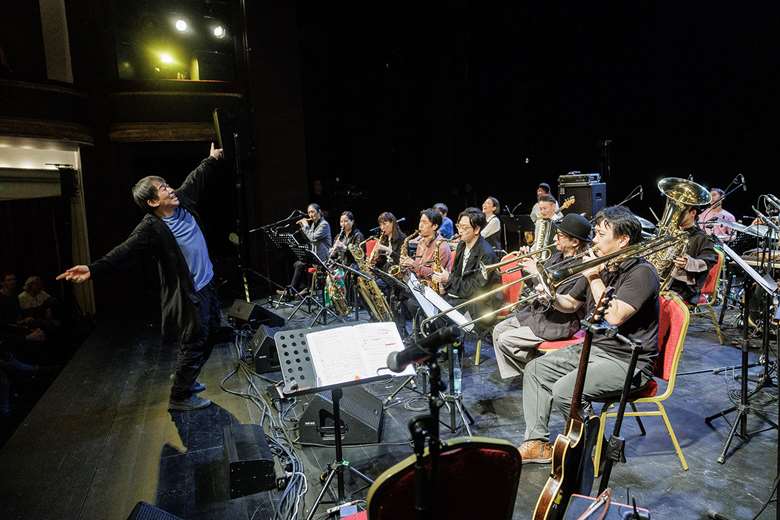Vilnius Jazz packs in Japan´s Otomo Yoshihide Special Big Band on busy 2024 line-up
Christoph Giese
Friday, November 15, 2024
For over a week Lithuania´s capital offered many dicoveries in jazz and also film

Long live the duo! Fans of this smallest line-up after the solo should have gone home satisfied after the first evening of the 37th Vilnius Jazz. Festival director Antanas Gustys put three duo formations on the stage of the beautiful Vilnius Old Theatre. Vytautas Landsbergis, musician and musicologist as well as important politician and first head of state of his country after Lithuania regained its independence in 1990, read out his own poetry. The legendary Russian Vladimir Tarasov, who has lived in Lithuania for a long time, spontaneously drummed whatever came to his mind. Unfortunately, the whole thing was often a little lacking in excitement. Certainly also because non-Lithuanians did not understand the Lithuanian texts. The two Frenchmen Vincent Courtois and François Corneloup on cello and baritone saxophone, on the other hand, needed no words and delighted the audience with their conversations between catchy, short bursts of melody and free thoughts, as did the Australian duo Alister Spence (piano) and Tony Buck (drums) afterwards.
The second festival evening went straight into full swing. Flute, percussion and electric harp are an intriguing instrumentation. And what Delphine Joussein, Rafaëlle Rinaudo and Blanche Lafuente do with them as Trio Nout is wild. The young French women not only modify the sounds of the flute and harp, which then sound like all sorts of instruments, they also serve up a beguiling mix of jazz, noise rock and electro, which at times sounds detailed, quiet and almost acoustic, but at the next moment is brute and crashes over the listener like a heavy metal thunderstorm. Amirtha Kidambi's Elder Ones then focus more on hypnotic soundscapes. The charismatic figure of the US band is the Indian-American singer and harmonium player Amirtha Kidambi, whose strong social and political awareness she does not hide in her announcements, perhaps even emphasising it too often at times. Her drones produced on the harmonium and her often wordless vocals are contrasted by her band with two excellent saxophonists, double bass and drums with many textures and rhythms, creating gripping spiritual jazz with a South Indian flavour.
A Japanese evening started with three, albeit somewhat lengthy, sound seekers, with Lithuanian pianist Gintė Preisaitė and the two Japanese musicians Sachiko M on oscillator and percussionist and marimba player Aikawa Hitomi. In any case, the highlight was the performance of the many-member Otomo Yoshihide Special Big Band. The legendary guitarist's orchestra and its hardcore avant-noise-jazz-rock concoction swept the audience away in the sold-out theatre with a lot of verve and occasionally wonderfully groovy, catchy passages and hot brass sections.
The LENsemble by Lithuanian conductor Vykintas Baltakas, a band of eleven woodwind and brass players, double bass and drums, reinforced at Vilnius Jazz by Belgian soprano Naomi Beeldens, demanded a lot of attention from the audience. Especially with the half-hour multimedia work ‘M is for Man, Music, Mozart’ by Dutch composer Louis Andriessen, to which British film director Peter Greenaway contributed socially critical, provocative film sequences that were shown on a large screen above the stage. A play with words, images drawn with sensitive aesthetics, a work for the senses that raises questions. Superbly performed by the LENsemble. Andriessen's work ‘Il Duce’ is also provocative in Vilnius. Not so much with the excerpts from a speech by the Italian dictator Mussolini per se, but how his words are then looped for several minutes, slowly dissolving and self-destructing through skilful tape manipulation - a powerful statement on the subject of fascism, which is brought to a fitting close at the end with a coda featuring the famous sounds of Richard Strauss' “Thus Spoke Zarathustra”.
The Vilnius Jazz Young Power competition in the theatre and interesting lectures on the art of arranging or Japanese jazz culture, which took place for the first time in the stylish Museum of Modern Art, the MO Museum, rounded off the festival. And for the first time, there were also cinema evenings directly before and after the festival days, with interesting films by British documentary filmmaker Dick Fontaine about Art Blakey or Sonny Rollins. And his depressing film ‘I Heard It Through The Grapevine’ from the early 1980s, in which the camera accompanies the African-American civil rights activist and author James Baldwin on a journey through the American South, caused a stir. The film looks back at the black civil rights movement in the 1960s. A terribly topical and therefore important film. It doesn´t always have to be jazz at a jazz festival.


